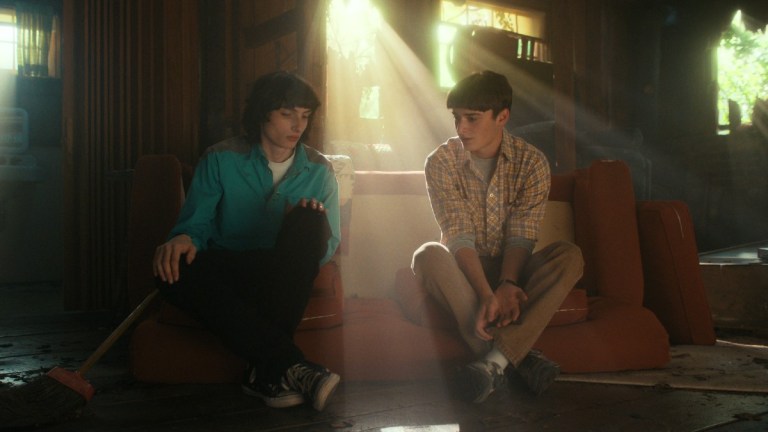Stranger Things Season 5 Should Embrace a Mike and Will Romance
Stranger Things season 5 can make LGBTQ+ history by bringing Mike and Will's story to a logically romantic conclusion.

Netflix’s Stranger Things is a phenomenon like no other in TV history. Since its premiere in 2016, this science fiction spectacle has garnered millions of fans and plenty of critical adulation due to its daring confidence to try new things that other shows have been too scared to do in the past. Employing child actors in the main roles and relying on niche genre tropes like 1980s horror homages are just some of the ways creators Matt and Ross Duffer have pushed the envelope through the years. With only one season left to complete their masterpiece, the brothers have an opportunity to shatter one final barrier that could positively change representation on television forever.
Will Byers (Noah Schnapp) is as vital to the Stranger Things as any other character because of his inherent connection to the show’s roots back in the first season. Will was the catalyst for the entire plot of the premiere episode and beyond when he was taken captive in the Upside Down, an alternate mirrored universe of the show’s fictional prime location in Hawkins, Indiana. He’s eventually saved by his mother, Joyce (Winona Ryder) and the heroic police officer of the Hawkins, Jim Hopper (David Harbour). As the series moves past these small-scale origins and the threats grow more vast, Will’s screen time has unfortunately started to dwindle quite a bit. He often serves as a sidekick to other characters’ stories, especially best friend Mike Wheeler (Finn Wolfhard) and the badass telekinetic Eleven (Millie Bobby Brown).
The Duffers have ingeniously been able to keep Will in the fold in a very important way, though. His connection to Vecna (Jamie Campbell Bower) and the Upside Down makes him an outsider amongst his friends, a group that is already unconventional in nature. Will is isolated and serves as a conduit between two different realities, both in the science fiction themes of the story and the romantic and coming-of-age plotting by the Duffers. As many of the main children have started to date and show their interests in the opposite gender of their own, Will is unable to feel those same heterosexual yearnings. It’s clear the character is gay, and actor Noah Schnapp confirmed this suspicion quickly following his character’s climactic scene with Mike in the fourth season. Including a non-straight character under the show’s location and time-period circumstances is a key launching pad for revelatory storytelling.
We must remember that the show takes place in a Midwestern town in the 1980s. This combination of time period and geography was quite literally fatal for those who actually lived through the same scenarios. Americans were deathly afraid of HIV during that time, a disease that came to be primarily tied to the LGBTQ+ community in the public’s consciousness due to so many queer people contracting the illness. The conservative political leanings of Indiana would only add to the intolerable attitudes of the population. When Will comes out in the fifth season, it has a chance to be a special moment in TV history because of the courage it would take for a character in his situation to do so. But there’s one extra step the Duffers should be willing to take that will truly elevate the material into something that will live on forever in LGBTQ+ television, and there are several hints they’ve already dropped that keen viewers have noticed.
Will has been yearning for Mike for at least a couple of seasons now. His veiled confession of his love for Mike during the fourth season’s second half was iconic, but also window dressing. Anyone with decent gaydar knew Will was part of the community. Mike is the character that may have a lot more going on underneath the surface than many less tolerant viewers are willing to admit, though. Mike’s been dating Eleven for the majority of the series, but their romance has waxed and waned, with chemistry issues and typical teenage angst getting in the way of their true feelings for each other. Mike and El simply may not be right for each other, and this opens the door to the true endgame relationship that so many have been hotly anticipating.
Mike and Will becoming a couple would become a landmark moment for a myriad of reasons, but it wouldn’t just be for show or to force representation. The Duffers love to slowly reveal their true intentions with their characters, often taking many seasons to tangibly manifest a plot development or character arc. For example, Hopper and Joyce have been kindling their romance for four seasons, only to finally have it consummated in a kiss in the previous season’s finale after Hopper is finally free from a Russian prison.
Mike and Will have been inseparable and much closer than the other boys in the show going back to the very first episode. Yes, Lucas (Caleb McLaughlin) and Dustin (Gaten Matarazzo) were also concerned about Will’s well-being, but Mike made it his sole purpose to find his best friend at all costs. After Will is found and struggles in his battle with the Mind Flayer in the second season, Mike is tender and often much more emotionally intimate with Will than most pre-pubescent boys are with one another.
Detractors of the Byler (combination of Byers-Wheeler last names) relationship often say the two characters are simply showing their strong platonic feelings for each other, and this is not out of the question. It’s important for men to bond in non-romantic ways, but the Duffers have also planted evidence in favor of the two sharing something deeper. Throwing away the pieces to the puzzle they’ve been putting together so meticulously would be almost illogical at this point.
As the characters have grown into their teenage years, the roles Mike and Will serve in each other’s lives have reversed in some ways. Mike is now more distant and awkward around Will. He doesn’t know whether to go in for a hug after being away, he doesn’t write to his best friend in the intermediary, and he wants Will to know there is a clear difference between his romantic relationship with Eleven and his platonic one with Will.
Mike is obviously clueless in many ways, something actor Finn Wolfhard has talked about in the past. Part of being absent-minded is not understanding your own feelings and emotions, and as the show heads to its final season, Mike seems to be hesitant to admit to himself that he’s growing further from Eleven and even closer to Will. Internalized homophobia and questioning of one’s sexuality would have been massively prevalent in the 1980s for a teenage boy like Mike.
The Duffers have been able to walk an ambiguous tightrope in writing Mike’s journey, but they make sure to pair Will with him during the most vital turning points in the show. Look no further than the two boys being together with two of the show’s most popular romantic combinations (Joyce/Hopper and Jonathan/Nancy) in the final shot of season four.
Stranger Things is a very visual show. These artistic markers are more than coincidental. They are a perfect way to ease the audience into the revelation that Mike and Will are a symbol of suppressed queer love during a time period where it was outright culturally forbidden. Mike and Will can force millions of viewers to see the normality of same-sex relationships in a whole new light. LGBTQ+ people had to stay buried deep in the closet during the 1980s. Mike and Will becoming involved is a much needed cathartic healing of homophobia and misrepresentation during that decade and beyond. It will retroactively recognize the gay pairings that weren’t allowed to come out, both in the fictional world and real life. And with so much hatred and bigotry towards LGBTQ+ marketing and Pride Month celebrations right now, Byler serves as a rainbow-colored middle finger to the intolerant.
Stranger Things is the most watched English-language series in Netflix history. Its audience is so vast and includes all different ages, genders, nationalities, etc. Putting two main characters in a same-sex relationship for that many people to see would be an all-time moment for LGBTQ+ characters. Shows like Love, Victor and Heartstopper are advertised as being for a specific target demographic, one that is already comfortable with the idea of gay liberation. While these series are groundbreaking, they’re still niche. Their representation doesn’t alter the collective mindset of the audience because the people watching don’t need a perspective change. Stranger Things would cement itself as a social force and an indelible barrier-breaker in LGBTQ+ television. The fact that the Duffers may have been carefully plotting it out for almost a decade makes it that much more special.
